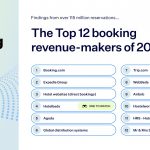What makes a hotel profitable can be narrowed down to one thing: its guests!
NB: This is an article from Hotelogix
The guest experience is the main driver of continuous revenue for any successful hotel. When guests are unhappy with their stay, they’re unlikely to return or recommend your hotel to new customers. In the digital age of online reviews and bloggers, the guest experience has become even more important.
Subscribe to our weekly newsletter and stay up to date
Once a guest has an unsatisfactory experience at a hotel, there isn’t anything hoteliers can do to prevent them from sharing that with the world.
However, what hoteliers can do is focus on ensuring an exceptional guest experience every time. Guests who enjoy their experience will return to your hotel, recommend it to others, and maybe write a glowing review about it online!
Using the Guest Experience to Your Advantage
The value of word-of-mouth marketing is often overlooked, though it shouldn’t be. A happy guest can easily bring friends and family who will give your hotel new business.
Plus, in today’s world, word-of-mouth goes far beyond someone’s personal circle. Folks can share their experiences on social media, blogs, or online review platforms for the public to see.
Hoteliers need to focus on fine-tuning their guest experience to be unforgettable. It can be hard to know where to start when looking to improve the guest experience – but we have some helpful hints below.
Operational Efficiency
An amazing guest experience starts with the basics. If your hotel is disorganized, the guest experience immediately suffers. This all starts with ensuring you have the right systems to maintain top-notch operational efficiency within your hotel.
For example, a guest who goes to check in at their hotel and waits in a long line will get a negative first impression. Luckily, there are hotel technologies available to mitigate these situations. By investing in a property management system, hoteliers can reduce check-in times and prevent frustrating lines.
A PMS can allow hotels to review guests’ information and payment details before they even arrive, making check-in a total breeze. Some cloud-based PMS systems even offer remote check-in, where guests can check themselves into their rooms at a kiosk or on their own devices.
With a PMS system, your front desk can easily access upcoming reservations and ensure they are totally prepared. This prevents bad guest experiences, like the front desk not having a key ready, or the room not being cleaned in time.
A cloud-based property management system tracks all operations in a hotel – from the housecleaning schedule to the updated availability, making it easy for staff to accommodate guests with the click of a button. Without integrative technologies like these, operational efficiency can suffer greatly.
To increase operational efficiency, hoteliers need to identify where snags are happening and why. If guests’ rooms are frequently not ready by check-in, it’s time to explore that. Perhaps the housekeeping team would benefit from mobile software like a cloud-based PMS that allows them to communicate which rooms are ready.
Optimizing your operational efficiency should be a priority – without it, the guest experience will suffer even if a hotel is doing everything else right. Plus, operational inefficiencies can cost your hotel more in labor and mitigation of errors, which detracts from revenue.
Personalization and Customization
Hospitality is a people-centric industry. When embarking on a travel experience, guests expect their needs to be cared for. Hotels that go above and beyond to show guests they care will have higher guest satisfaction rates.
With today’s hotel technology, it’s easy to personalize a guest’s experience. When guests book online, they can enter any pertinent information about their trip – such as the occasion they’re traveling for. By having guests note the reason for their stay, your staff can prepare personalized touches for them.
For example, if someone notes they are coming for their honeymoon, this can be a great time to ‘wow’ your guest! Simple touches, like a bouquet and bottle of champagne in their room, can make all the difference. Some hotels may even offer discounted upgrades to larger suites for folks traveling for a special occasion!
Even for guests who choose not to note their reason for visiting, hotel teams should make efforts to personalize the experience. Staff should be trained to build connections with guests and go beyond the typical script when speaking with guests.
If a guest is struggling with their bags, a concierge should be there to help. If a guest mentions not knowing where to eat in the area, a staff member should be enthusiastically offering suggestions for nearby restaurants.
Regardless of someone’s reason for travel, a hotelier should always ensure that each guest feels special and taken care of, from the moment they step foot in the lobby. This is best accomplished by a combination of utilizing technology and in-person relationship building.
Positive Online Reputation
Assuming a hotel is doing everything it can to make the guest experience seamless and enjoyable, a positive online reputation should be easy to maintain. However, there are always secluded incidents, and guests who have false expectations of their visit. In short, you can’t please everyone.
So, what happens when one or two negative reviews pop up about your hotel online? Negative reviews feel frustrating to receive – but they can be a huge opportunity for hoteliers.
Hoteliers should have a management member, or a dedicated customer support team, that responds in an empathetic and timely manner to any negative reviews. Responses to negative reviews should always include sincere apologies and provide contact information for the guest to get in touch with the company.
Hotels should offer incentives to make the situation right, like a credit towards a future room or a small chargeback on money spent, where necessary. Showing that you are aware, responsive, and empathetic to guests who have a negative experience indicates to prospective customers that you care about their experience.
Hoteliers should also use negative reviews as constructive feedback. If the same subjects keep being mentioned in guest reviews, it’s time to review the items that are being poorly rated. For example, if guests are unsatisfied with the cleanliness of the rooms, perhaps audit your housekeeping services and see if you need more staffing.
By paying close attention to your online reviews, you can ensure your online reputation is top-notch, which will influence more people to book rooms at your hotel over the competition.
Bottom Line
If you want more revenue, your guest experience should be your priority. Hotels that provide exceptional guest experiences rank better in online reviews, get more referrals, and secure the business of more return customers. All of this results in greater revenue and a more successful hotel!
Read more articles from Hotelogix
The post Ways to Drive Higher Revenue with Higher Guest Satisfaction appeared first on Revenue Hub.
































